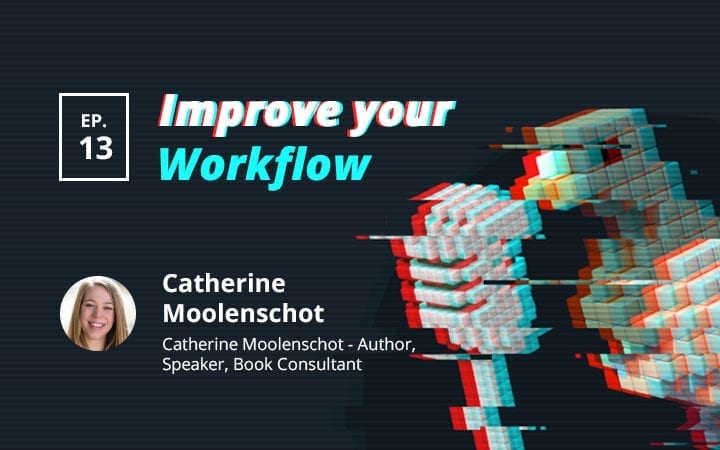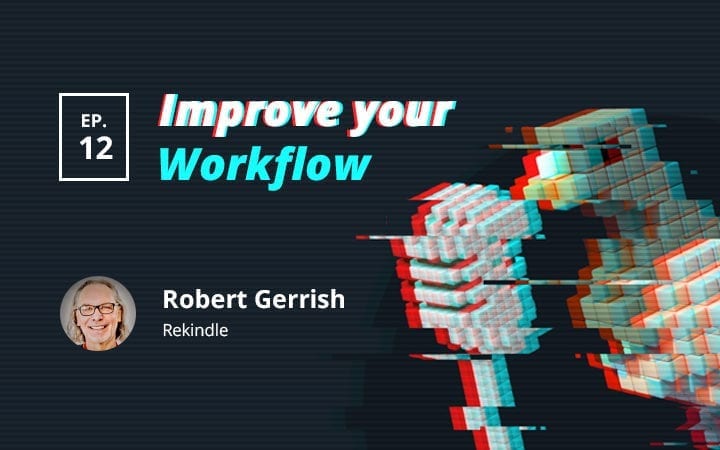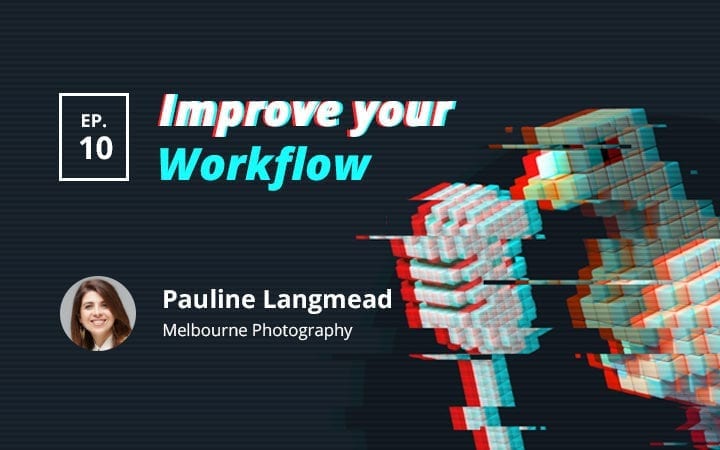Improve Your Workflow Episode 14 with Louise Berger
Digital Pigeon
24 October 2019Louis Berger is the Creative Designer of Louis B Creative, a design studio based in the Mornington Peninsula, her clients consist mostly of purpose-driven, non-profit individuals and companies and social enterprise.
Learn more about Louise B Creative:
- Louise B Creative: https://www.louisebcreative.com/
- Louise B Creative Facebook: https://www.facebook.com/louisebcreative/
- Louise B Creative Instagram: http://instagram.com/louisebcreative/
Products / Software mentioned in the show:
- Adobe Creative Suite: https://www.adobe.com/au/creativecloud.html
- Trello: https://trello.com/
- Streamtime: https://streamtime.net/
- Rounded: https://rounded.com.au/
Manual technique/s being practised:
- Calendar and time blocking
Brand/s mentioned in the show
- Frankston Foundry: https://apply.frankstonfoundry.com/
- AIME Mentoring: https://aimementoring.com/
Transcript of Improve Your Workflow podcast with Louise Berger
Voiceover:
Welcome to the 'Improve Your Workflow' podcast, brought to you by Digital Pigeon. Learn from other creative and media businesses about attracting more work, delivering projects efficiently, getting paid on time and everything in between.
Paul Evans:
Hi there, and welcome to episode 14 of Improve Your Workflow. My name is Paul Evans and today I'm chatting with Louise Berger. Welcome to the show Louise.
Louise Berger:
Thanks Paul. Good to be here.
Paul Evans:
Great. Could you tell the listeners what you do and who you do it for?
Louise Berger:
Absolutely. So I'm a graphic designer and I run a small design studio, a one girl band, so to speak. And on the Mornington Peninsula called Louise B Creative. So I work largely with clients in the positive impact space, helping them to elevate their visual communication and branding, and help make a difference in what they do.
Paul Evans:
Okay. What does that mean exactly, like positive impact?
Louise Berger:
Yeah, so I focus I guess on working with people who there's a positive purpose to what they're doing. So it's, I guess you could say a little bit more about purpose over profit. It might be something as straightforward as them being a non for profit or working as a social enterprise or they might be a more commercial and for profit business, but they're working say maybe in the health space, or it may be in leadership development or something like that. So there's a positive impact from the work that they're doing.
Paul Evans:
Yeah. Got you. All right. So you referred to yourself as a one girl band, I think it was.
Louise Berger:
Yeah.
Paul Evans:
So you must have a few tricks up your sleeve when it comes to getting work done. Do tell us what would your number one productivity hack or tip for the listeners is.
Louise Berger:
Definitely. I love all things productivity, so it's hard to sort of find just the one. But I think you've definitely got to, as you say, have a few tricks up your sleeve when you work for yourself. I think probably one thing for me is I'm a big fan of calendar blocking and time blocking rather than a traditional to-do list. Yeah. So I guess rather than writing out a list of everything that I need to do in a day and instead of just leaving it at that and trying to work through it, I'll actually schedule that task onto my calendar for the day or during the week so that there's time allocated to it so that I know that this is when it's going to happen. And then if I can't do that, it means it has to get shifted elsewhere.
So it just allows me to be a lot more conscious of what I'm spending my time on. And it also is good, it helps me to not over commit to the day as well, because I'll see straight away. You know how sometimes you can put 15 things down in your to-do list with this really ambitious... You had your coffee in the morning like, "Yeah, I can get this done." And then it gets to half way through the day and you're like, "Oh."
Paul Evans:
Done two.
Louise Berger:
Yeah, exactly. So if I feel like I block that out in the morning, I can kind of get a sense of, "Oh okay, is this realistic or am I going to need to shift my expectations?" So just helps prevent that burnout that I think can be pretty easy to come by sometimes when you work for yourself and in creative industry. So yeah, that's probably a big one for me. Yeah.
Paul Evans:
Yeah, okay. On that, how do you sort of block out any distractions? Because I've tried that method. I'm not an expert at productivity by any stretch of the imagination, and this is why I'm running this podcast is to learn. Yeah, I always find I block out time, but you know then the email start, the phone calls start. Do you have any sort of tips?
Louise Berger:
Yeah, I think I don't completely block my day to the nth degree, so I leave some white space in between so that if something does come up... Also I work out of a co-working space. Shout out to the Frankston Foundry. So one of the perks of that is it's a good community and sometimes that means if someone comes in and sits down at their desk and you haven't seen them for a few days, you might say, "Good day." And you might get a little bit distracted. So I find that if I don't... Say if I've got eight hours in a day, I won't block all eight of them out. Or if I'm going to block it out, I'll block breaks in there so that there's a bit of flexibility. And another thing too is I'm trying, it's a work in progress but I'm trying to not necessarily respond to my email notifications when they come through and try and batch those a little bit.
So check it in the morning and doing it when I've got a scheduled sort of moment where I can go, "Yep, I've got time to actually pay attention to this." Because otherwise it hijacks your time in about two seconds flat, and you can find yourself knee deep in your inbox at the time of day when you're feeling more creative. And it wastes your time, not waste your time, but you waste that creative energy on something that could have been done at a different time when your brain is in a better space for that. So it's all about energy management I guess, as much as time management. Yeah.
Paul Evans:
Cool. All right. So a graphic designer, you obviously use a fair bit of technology, I assume. You're not hand drawing everything. Can you tell us a bit about your tech stack and I guess the tools that help you get your job done?
Louise Berger:
Definitely, yeah. I do definitely find myself being a combination of old school pen-to-paper and tech, but tech definitely takes up a huge part of my workflow. So I guess straight off the bat I use the Adobe Suite, the Adobe Creative Suite for all my design output. So a lot of Adobe InDesign for layouts, Illustrator as well for vector graphics, and a bit of Photoshop as well. So I spend most of my day on those. And then I guess in terms of productivity, I use a combination of Trello and Streamtime to manage all my jobs and my workflow. So I really love both of those tools and I've sort of got them working fairly well together. Trello is a lot for my work flows and processes and managing the content and process for specific jobs as well. Keeping things in in one place.
I love the fact that you can move content between lists and it's very intuitive that way. So being a visual person, that makes a massive difference and then Streamtime, that's definitely been created with creatives in mind. And I use that for planning, scheduling, costing up my jobs, managing all of my time, tracking on jobs and wording of that. And it's got a really good interface for all that sort of stuff, and it means that the way it's set up, in a couple of clicks, I can pretty clearly see what I've got on, how they're positioned in terms of budget and all that sort of stuff. So that's a really powerful tool. I've started using that in the last couple of months and it's still-
Paul Evans:
Yeah, I haven't heard of that one. I'll have to check that one out.
Louise Berger:
Yeah. I think it's a joint venture between... I think maybe it's a Kiwi Company originally, but I know they've definitely got an office in Sydney and it's a lovely team up there. So yeah, they're a good team to go with. They've been around for a while, but they had a massive redesign in the last, I don't know, recently. And so I didn't know of them before that. But the redesign has made it really, really clever. So actually I use that. And then I use Rounded as my accounting platform, which is... of other local startups.
I know they're definitely Australian based. I think they're Australian based and they're brilliant. Yeah. Have you come across them as well?
Paul Evans:
I've come across them, yeah. I've not used them but I've definitely heard of those guys.
Louise Berger:
Yeah, I like them because it's accounting software that's quite tailored to freelancers and sole traders. Sometimes I find with some of the bigger packages, while they're fantastic, I don't necessarily need all of those features right now and it can be a little bit overwhelming. Whereas Rounded is in that good position where it's just what I need. Yeah.
Paul Evans:
Yeah. All right. So we'll just take a few seconds now to hear from our sponsor.
Voiceover:
This episode is brought to you by Digital Pigeon. Digital Pigeon is the leading file sharing service for creative and media businesses that can't afford to miss deadlines. With a focus on moving large files from A to B quickly and reliably, Digital Pigeon is the tool you can count on where others fail to deliver. Try Digital Pigeon out for free today at www.digitalpigeon.com/workflow for an extra long 90-day trial. Now back to the show.
Paul Evans:
Louise, if you could work with one brand that you don't already work with, who would that be and why?
Louise Berger:
Okay. That's like being a kid in a lolly shop
Paul Evans:
For a designer, yeah.
Louise Berger:
There's so, so many. I'll try to narrow it down to one. I think there's an organization called AIME, AIME Mentoring. They are an Aussie based organization and basically they provide mentoring programs and experiences that connect high school kids who are sort of doing it a bit tough with universities, and giving those kids the opportunity to really reach their potential and push beyond some of the barriers that they think might exist for them. And they've got a fantastic, really colorful, beautiful, strong brand, and they're doing fantastic work in the world. So I reckon that'd be a pretty rockstar thing to collaborate with. I'd love to be involved with them. Yeah.
Paul Evans:
Awesome. They're interesting. All right. In terms of problem solving, again, as a one person business, you can't say Google, but how do you go about solving problems that you don't know the answer to? You were going to say Google weren't you?
Louise Berger:
Oh look, is that everyone, or me? Where we would be without Google at times? Yeah. I think that problem solving side of it is so important and I think as you say as business owners, I don't think we're ever not problem solving. It's a massive part of what we do. But I guess as I mentioned earlier, I work out of a co-working space and, and there's a really good network of people in there that are very helpful and very knowledgeable and we all get along quite well and there's lots of different expertise, you know, people doing different stuff in this space. So it's definitely not all just creative. So that often tends to be my first protocol, just naturally.
Paul Evans:
I find that as well. In a co-working space and yeah, just people doing all sorts of different things.
Louise Berger:
Definitely. So often it's like, "Oh, I'm having a bit of trouble with this thing. Have you come across it or can you help me with it?" And I then have been in a position where I've been able to help other people with their questions as well. So it's a shared thing which is hopefully I think also I've had a really fantastic experience with mentoring over the years as well. I don't think I could overstate the value of the support knowledge that you gain from having a mentor. Like I can think specifically there was a mentoring program I was part of a few years ago with the iGen Foundation and Enterprising Partnerships. They put together a program called getting down to business and it was like a entrepreneurship mentoring program for under 25s and it was a really supportive and positive program, and I'm still in touch with the other people in my cohort and some of the people that were mentors for me through that as well.
And it's just great to have a network of people that you can bounce ideas off that are a little bit further ahead of you as well as some people that are at the same stage as you. So mentoring is a huge one I think for me. And also in terms of mentoring on maybe more design-specific level, there's a great set up called the Design Business Council. They're based here in Melbourne and they've got heaps of good content that you can access that's just really practical about the business side of design. Yeah, they offer mentoring as well. And just why wouldn't you take advantage of being able to learn from people who've made the same mistakes that you might make.
Paul Evans:
Yep, 100%.
Louise Berger:
Exactly, and then I'm hoping that one day I'll be able to do the same for other people when I'm in a position where I've gotten further down that track and can help people who are coming up. So it's a nice little circle of giving there. So, yeah, that's a good thing.
Paul Evans:
That's awesome. Cool. All right, last question in studies. How can our listeners connect with you?
Louise Berger:
Oh, that's an easy one.
Paul Evans:
Finish with the easy one.
Louise Berger:
Exactly. Yeah. So the best protocol I think would definitely be my website, so that's www.louisebcreative.com. All my contact info is there. It's easy to get in touch with me. And I'm also on Instagram and Facebook too as Louise B Creative and I do try to keep that up to date.
Paul Evans:
Good work. Awesome. All right. Thanks for being on the show Louise.
Louise Berger:
Oh, thanks very much for having me, Paul. It's been good fun.
Paul Evans:
Some fantastic insights there from Louise on improving workflow. My number one takeaway was to block out time in your calendar, but also give yourself that flexibility to adapt when it needs to be done. I believe I've first read about batching in the four-hour workweek by Tim Ferriss and I think that's a topic for another episode, but batching is an absolute must do. Thanks again for tuning in and until next time, keep on delivering.
Voiceover:
Thanks for listening to the Improve Your Workflow podcast. If you enjoyed the podcast, please leave us a review on iTunes. Go to www.digitalpigeon.com/reviewpodcast/ for more info and we'll add you into our monthly draw to win a digital Pigeon T-shirt. Bye for now.
Listen on



